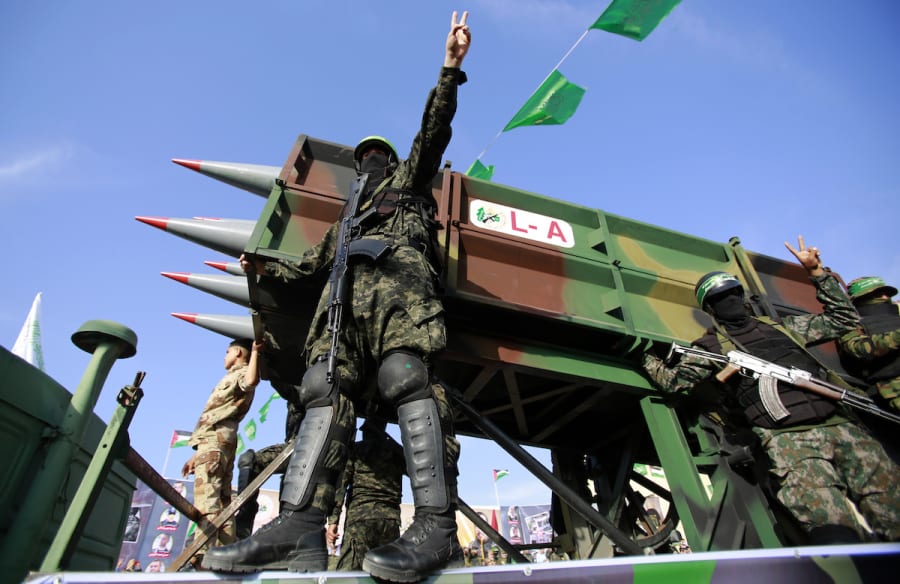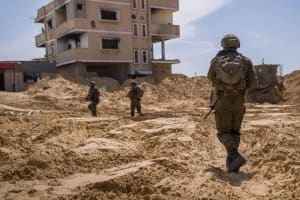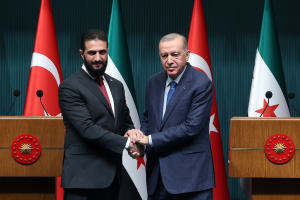Where was Hamas? Why the leading terrorist group in Gaza did not participate in the last round of fighting
Hamas has faced backlash from both Iran and Syria for standing down

While the Israeli Operation Breaking Dawn in early August focused entirely on taking out key members of the Palestinian Islamic Jihad (PIJ) in the Gaza Strip, the Hamas terrorist group, which controls Gaza, decided to sit the fighting out.
In the weeks since an Egyptian-mediated ceasefire took effect, both Israeli and Arab pundits have been baffled by the unexpected passivity of Hamas. Iran and the regime of Syrian President Bashar Hafez al-Assad said it was a “betrayal of the resistance.”
Criticism against Hamas also mounted in the Arab and Palestinian media.
A pro-Hezbollah Lebanese daily Al-Akhbar bashed Hamas for “failing to lift a finger” in defense of Jerusalem. An editorial in the Palestinian Authority daily Al-Hayat al-Jadida accused Hamas of making “empty threats” while de facto cooperating with Israel. One Palestinian journalist stated that Hamas had emerged as the biggest loser of the conflict.
In an Aug. 14 interview on BBC Arabic, Hamas’ international relations head, Dr. Mousa Abu Marzook, responded to critics who had slammed the organization. According to a translation by MEMRI, Abu Marzook said public demand does not determine whether to participate in the conflict as “there are other considerations that have to do with the war itself.”
Abu Marzook stressed that not every Israeli assassination provides a casus belli: “You do not go to war over every person who is assassinated, regardless of his affiliation. Many of our commanders were targeted and no war ensued.”
Where Hamas has been accused of abandoning the “Unity of the Battlefields” concept – a strategy that calls for attacking Israel on multiple fronts: from Gaza, and throughout Israel – particularly in Jerusalem, Judea and Samaria – Abu Marzook insisted the term has been misunderstood.
According to the MEMRI translation, Abu Marzook said the “Unity of the Battlefields” term “means that the enemy will not succeed in separating Jerusalem from the West Bank, the West Bank from Gaza, or Gaza from the Palestinians [Israeli citizens] within the occupied land [Israel].”
Arab pundits pointed to a range of possible reasons behind Hamas’ abstention in the fight: whether because of a rift between Hamas and Islamic Jihad or because of trilateral pressure from Egypt, Qatar and Jordan on the Hamas leadership.
An editorial in Jordanian newspaper Ray-al-Youm suggested that Hamas has realized that an intense round of fighting with Israel would be bad for the people of Gaza at the present time. According to the commentary, Iran, which has been giving marching orders to the Palestinian Islamic Jihad behind the scenes, supposedly ignored this and expected Hamas’ participation.
Whereas Hamas only leans on Tehran, the Islamic Jihad is fully dependent on the Ayatollahs; the smaller terrorist group, whose leader, Ziyad al-Nakhalah, is mostly Tehran-based, is committed to obeying Iran’s directives.
“Palestinian Islamic Jihad is basically an Iranian militia. It is trained, it is funded, it is equipped by Iran,” said Brig.-Gen. (res.) Amir Avivi, CEO and founder of the Israel Defense and Security Forum.
“In Iran’s vision, they would like all of Palestinian society to be part of this organization and make the Palestinian society an Iranian force,” he said.
Veteran Middle East expert Guy Bechor noted that Hamas’ abstention from the fight should be a concern for the Iranian regime.
“The fact that Hamas stayed away from the fighting sent a signal to Iran, that its influence over this organization has dwindled,” Bechor wrote on his commentary website Gplanet. “This, whereas the influence of Egypt and Turkey has increased, and both are inching closer towards Israel these days.”
Hamas began as an offshoot movement of the Muslim Brotherhood in Egypt in the late 1980s, during the First Intifada. Aspiring for independence, Hamas founder Ahmed Yassin avoided being supported by Iran directly, and the organization’s connection with Iran has been weak and unstable.
In the 1990s, after Israel expelled hundreds of Hamas operatives to Lebanon, a strong connection started building between Iran and Hezbollah, through which Iran has funneled money and arms to Hamas in Gaza, with Hezbollah as a go-between. This relationship grew after Hamas’ takeover of the Gaza Strip in 2007, then slightly fractured when the Syrian civil war erupted in 2011.
As a Sunni movement, Hamas chose to support the Sunni opposition against al-Assad, who is backed by Shiite Iran and Hezbollah.
Former Hamas leader Khaled Mashal, who was a founding member of the Hamas politburo in 1992, chose the patronage of Turkey and Qatar over Iran’s backing. Today, Hamas’ senior political leader Ismail Haniyeh and its leader in Gaza, Yahya Sinwar, have preferred to lean towards Iran.

Tal Heinrich is a senior correspondent for both ALL ISRAEL NEWS and ALL ARAB NEWS. She is currently based in New York City. Tal also provides reports and analysis for Israeli Hebrew media Channel 14 News.














